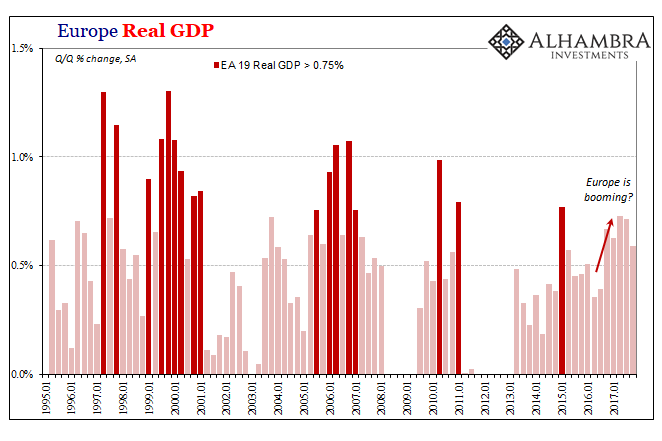Once the sick man of the global economy, Europe’s system had roared back in 2017. According to the narrative, everything is right right now on the Continent. Manufacturing couldn’t possibly be any better, and the ECB forced into “emergency” monetary measures for longer than almost anyone else (except, as always, Japan) is talking confidently about winding everything down.
We are told the concern there is more about overheating than any further weakness. Europe is, in short, booming.
Or is it?
The basis for the assertion is especially thin upon examination. Instead, the condition is purported on the strength of rather dubious measures and carefully orchestrated observations.
To start with, real GDP has been expanding for 19 straight quarters now. The last time the economy was in recession was five years ago during the first quarter of 2013. This sounds like an impressive record given so many challenges over that period.
Not only that, GDP accelerated in 2017. Over the last five quarters (through Q4 2017), growth hasn’t been less than 0.59% (Q4 2017). European GDP is calculated on a seasonally adjusted quarterly rather than annual basis, so that translates into about 2.4% as a floor. Five in a row above that level compares to the prior five quarters where 0.51% was the best among them.
These are not, however, in any way a basis for suggesting a booming economy. Far from it, they tell a very different story where when everything is apparently going right (globally synchronized growth) Europe’s economy can only manage low 2’s. That’s not good, and should be very concerning as to where the ceiling is – which ultimately matters more than the rest of the variables.


What’s really driving the narrative about Europe’s boom is PMI’s more than anything. After ignoring the manufacturing sector during the 2015-16 global downturn, PMI’s within it have exploded since “reflation” started in the middle of 2016 and are all over the mainstream news. Over on that side of the Atlantic, the numbers are truly astounding leading many to believe the economy has to be, too.











Leave A Comment